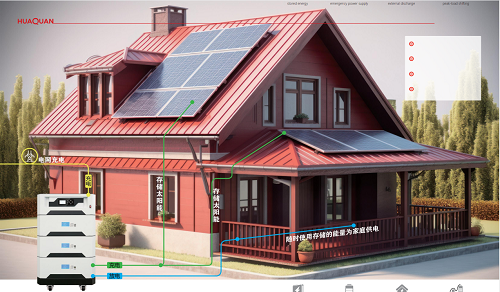
Home energy storage equipment is a device that stores electrical energy for later use. It is also called an electric energy storage product or a "battery energy storage system" (BESS), hereinafter referred to as home storage. The main components of home storage are rechargeable batteries, usually lithium-ion batteries or lead-acid batteries, as well as inverters and intelligent control charging and discharging systems.
The advantages of home storage systems include:
1. Reduce transmission losses: When power stations transmit electricity to households, there will inevitably be losses, especially in cities with high population densities. Because power stations cannot be built in urban areas, transmission losses are more serious. Encouraging households to generate and store electricity can reduce dependence on external electricity, thereby significantly reducing transmission losses and improving the transmission efficiency of the power grid.
2. Support the power grid: If the home energy storage system is connected to the power grid, the excess electricity generated by the household can be input into the power grid, which will greatly reduce the burden on the power grid. During peak power consumption, home energy storage can provide power response, reduce the use of inefficient diesel generators, and match the power frequency of the local power grid (such as 50Hz or 60Hz).
3. Reduce the use of fossil energy: Households can generate electricity and store electricity on their own, which can significantly improve the efficiency of electricity use, while gradually eliminating the generation methods that rely on fossil energy such as natural gas, coal, oil and diesel.
At the household level, home storage systems can:
- Reduce energy expenses: Households can significantly reduce the cost of purchasing electricity from the grid by generating electricity and storing electricity on their own.
- Avoid peak electricity prices: Energy storage batteries can store electricity when electricity prices are low and discharge it during peak hours.
- Achieve electricity independence: Households can store solar power during the day and use it at night, and it can also serve as a backup power source during power outages.
With the entry of energy storage technology into ordinary households, we can realize the concept of distributed power generation, ease the transmission pressure of the power grid, and reduce the use of fossil fuels, which is a necessary decentralized measure to achieve carbon neutrality or zero carbon emissions.
More information: http://www.jizunet.com/
